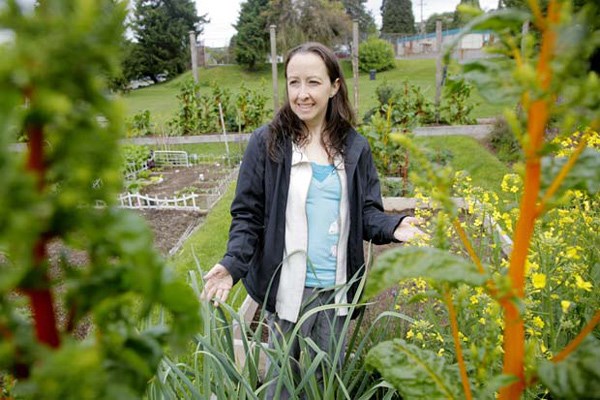It all started with a church. Sapperton's St. Mary's Anglican Church had some extra space on its property and approached the City of New Westminster looking to find a deserving group to share it with.
"That was the first garden," said Kathleen Somerville, co-chair of the New Westminster Community Garden Society. "(St. Mary's) went to the city saying 'we'd like to offer our space up' and we were looking at the same time for a space."
At the time - about three years ago - a group of community members were looking to establish a number of community gardens throughout New Westminster. The city notified them of the space at St. Mary's and they were able to strike a deal with the church to use the property. From there, the group expanded into the West End of New Westminster, first with a small community garden at St. Barnabas Church and later at Simcoe Park.
"Our whole idea was to have four gardens in New Westminster, one in each corner, . so far we've only got three, but it's proving to be a lot," Somerville said.
A lot indeed. The society is a non-profit group that manages three gardens in the city. Each garden required an impressive amount of planning, more than Somerville ever imagined.
In the beginning, the society spent quite a lot of time working with the city and stakeholders in the community to ensure they took the best approach to the community gardens.
"There was a lot of meetings with the city to get support," she said. "Everyone kind of backed the idea of creating a garden."
Each garden has a plot specifically for growing produce for the New Westminster food bank. There are also a number of communal plots that can be gardened and harvested by any member of the society. Simcoe Park garden is the largest of the three, with 30 plots for society members, four communal ones, and four for groups.
"(The gardens are) open to the public, and to groups in New Westminster to join," she said.
Over the past three years, different community groups, including Elizabeth Fry, Girl Guides and the Power program, have all had plots at the different gardens in the city. School groups have also joined in the gardening fun. Students from John Robson and the New Westminster Home Learners all use the gardens as part of their school programs, Somerville said.
The gardens are especially popular with local residents who apply for their own plots each year.
"That's why they come, because they don't have space to garden themselves," she said. "Some gardens have longer wait-lists - like " Simcoe Park has the longest wait-list, and I think it's because it's the most popular garden."
The other gardens have shorter wait-lists, but while waiting for a personal plot, people can garden the communal plots and still reap the tasty benefits come harvest time. A society membership costs $25 per year and there is an additional cost for a personal plot, ranging from $25 to $40 depending on the size.
"Each garden is kind of independent so there's different characteristics to each garden," she said.
At the beginning of the season, each group of gardeners plans out what the communal gardens will grow. The range of produce is very wide, Somerville said. Everything from carrots to beets to onions to corn to berries and everything in between.
"Pretty much anything," she said. "We've had a lot of success pretty much growing anything we've tried."
There are some rules on what can be grown, which members are informed of when they join.
"We have some rules around what you can or cannot plant," she said. "We've developed that over time, from season to season."
This is mostly to ensure each plot has the chance to thrive, meaning no large trees or shrubs.
The New Westminster Community Garden Society receives most of its funding from grants, fundraising and annual membership and plot fees.
"We're not a charity, but we are non-profit. We can accept donations but we can't give receipts so that's been difficult with trying to find funding," she said.
Right now, however, the society has managed to develop and sustain its community garden model and is anticipating yet another successful season, Somerville told The Record.
"It makes you feel you're in a different time," she said. "It's amazing."



